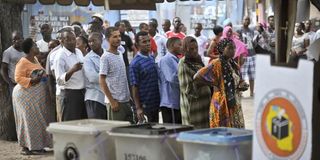Media players outline key issues for peaceful local government elections

Tanzanians queue to cast their votes in the presidential election, at a polling station in Dar es Salaam, Tanzania Sunday, Oct. 25, 2015. PHOTO | AP | FILE
What you need to know:
- Media stakeholders were also urged to resist manipulation by political candidates and focus on educating the public about the electoral process.
Dar es Salaam. With local government elections approaching on November 27, media stakeholders are banking on five critical considerations, including strict adherence to the election rules to prevent conflict among citizens.
The call emerged during a meeting held yesterday between media stakeholders and the police force, organised by the minister for Information, ICT and Communication, Mr Jerry Silaa, as part of preparations for the elections.
Speaking at the event, the head of information and communication at the ministry of Home Affairs Ms Christina Mwangosi, outlined resolutions from the meeting that include the need for journalists to receive ongoing training on best practices of election reporting to ensure peace prevails nationwide.
“The government, police and media stakeholders should hold regular meetings to safeguard peace and promote national development,” Ms Mwangosi said.
The meeting, which brought together over 200 participants, highlighted the crucial role of journalists in providing accurate and ethical election reporting. Mr Silaa, in his keynote address, reiterated the government’s commitment to supporting journalists in their work.
“Journalists play a pivotal role in informing the public, especially during election campaigns. They have a responsibility to adhere to the law, regulations, ethics, and the principles of journalism,” he said.
Mr Silaa revealed that Tanzania currently has 1,023 registered media outlets, comprising 179 newspapers, 174 magazines, 247 radio stations, 355 online platforms and 68 television stations.
He underscored the historical importance of the media in Tanzania’s development, both before and after independence, citing its role in mobilising support during the independence struggle and fostering national unity under the late Mwalimu Julius Kambarage Nyerere.
To further enhance the media sector, Mr. Silaa announced the imminent establishment of a Media Accreditation Board, set to launch early next month.
“This sector is governed by policies, laws, and guidelines. Your involvement in shaping these regulations has been invaluable,” he said.
Police Force Spokesperson Mr David Misime reassured journalists of the police’s commitment to ensuring their safety during the election period. He urged media practitioners to follow instructions issued by law enforcement to maintain peace and order.
“We prioritise journalists’ safety, but they must also consider the safety of others, especially during unrest. We have trained officers on handling election-related matters and reviewed past elections to improve our operations,” Mr Misime stated.
He added that the relationship between journalists and the police has improved in recent years, emphasizing mutual respect for their respective roles.
Media stakeholders were also urged to resist manipulation by political candidates and focus on educating the public about the electoral process.
The government’s engagement with media stakeholders and the police reflects its commitment to fostering a peaceful election environment while ensuring the media plays its critical role in nation-building.




